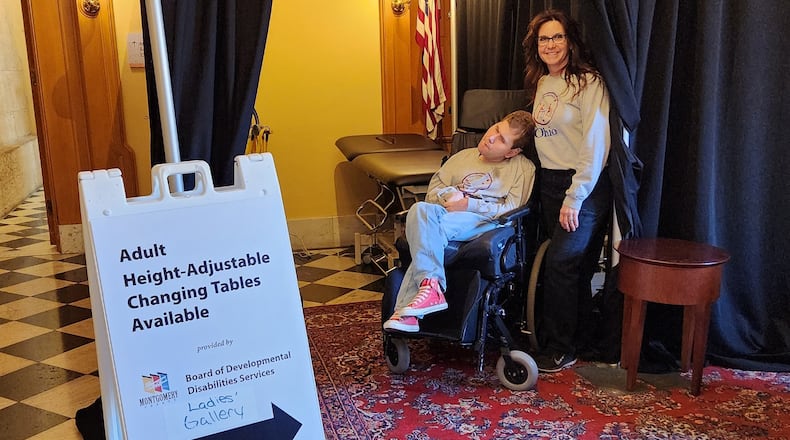Universal changing tables are long benches that can be used to change the clothing of a person who has mobility issues.
Several are installed throughout the Miami Valley, and that number will expand after the Montgomery County Board of Developmental Disabilities was awarded $125,000 in federal funds to put toward the project.
The International Code Council, a group that informs what requirements buildings need to safely house or serve people, adopted a new protocol surrounding changing tables following the expert testimony of Jennifer Corcoran, of Huber Heights; leaders of the Montgomery County Board of Developmental Disabilities and several caretakers of people with disabilities in 2021.
The council ruled that starting in 2024, construction for new “high traffic” buildings with six or more male and female restrooms will be required to include changing tables large enough for adults.
Each state can choose whether to adopt this requirement into its building code. If they do, impacted buildings could include universities and schools, libraries and businesses, among others.
“We have no reason to believe it won’t go into Ohio building code in 2024,” Corcoran said.
These universal changing tables are not currently required by the Americans with Disabilities Act (ADA).
Corcoran serves as a program consultant for the Montgomery County Board of Developmental Disabilities, and she leads two nonprofits geared toward accessibility and inclusion for people with disabilities.
Corcoran said she and her family made the decision early on that her son, Matthew, would not miss out on life experiences due to his disability. Matthew, who is now 22, uses a wheelchair and requires total care.
“Full inclusion has been a major goal for us,” she said. “We wanted him fully included in his community: he’s just as important of a member as anyone else. But the lack of these tables has been really the only stopper.”
The Corcorans found that every outing needed to be heavily planned: extra sets of clothing were packed, research about resources at nearby buildings was made, necessary food and medication was sorted and tucked away.
There were days where fun events the family attended were interrupted by Corcoran having to change her son in the back of the family’s van. Corcoran sometimes, too, brought a portable massage table with her to assist in the process.
Neither of these options were ideal, and Corcoran learned that her family was among many that make similar decisions during every trip and appointment.
Over the past several years, Matthew has had limited travel beyond Columbus due to the lack of tables.
Corcoran said that she’s talked to some people who go without food and water when they’re away from home because they’re unsure of where they can find a changing table large enough for them. Others have their caretakers lay down a blanket or towel on the bathroom floor to change them. Still others are left soiled.
“It leaves them no dignity,” Corcoran said. “It’s just awful. They can stay home and be isolated, or go out and be soiled, or not eat, or have no privacy.”
This addition to international building code came years after Cocoran worked with lawmakers in the Ohio House and Senate to pass legislation related to changing tables for adults. All four attempts failed.
Regardless of work through the International Code Council, changing tables will be coming to nearly 30 of Ohio’s revamped highway rest areas starting in 2024, Corcoran said.
Corcoran’s connection to the International Code Council came through her county’s board of developmental disabilities. Supt. Dr. Pamela Combs, assistant supt. Kamarr Gage and clinical psychologist Dr. Scott Kidd also presented expert testimony to the International Code Council in 2021, weighing in on the importance of the tables to the council.
The board sought and received American Rescue Plan Act funding to purchase and install changing tables across the county. Heading the project is Mitchell Snyder, provider relations director of the Montgomery County Board of Developmental Disabilities.
Snyder said the board is working with multiple locations to incorporate the tables into their restrooms. These tables can cost $2,500 or more, depending on their functions for height adjustments.
Dayton International Airport will be home to an adult changing table, as will the Dayton Art Institute. Plans for tables at several other Montgomery County locations are still in the works, Snyder said.
The new Huber Heights branch of Dayton Metro Library also has a changing table installed, using its own funds rather than federal relief.
The board also has its own table that can be booked for no charge. This table is mobile and height-adjustable, Snyder said.
“This will have a huge impact on adults who are out and about,” Snyder said.
About the Author

